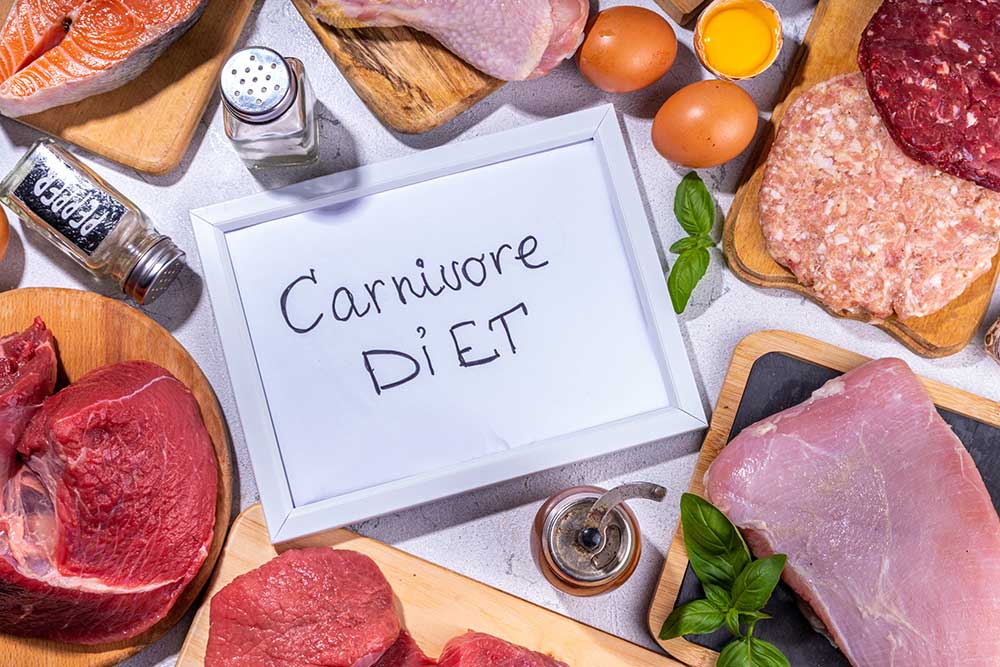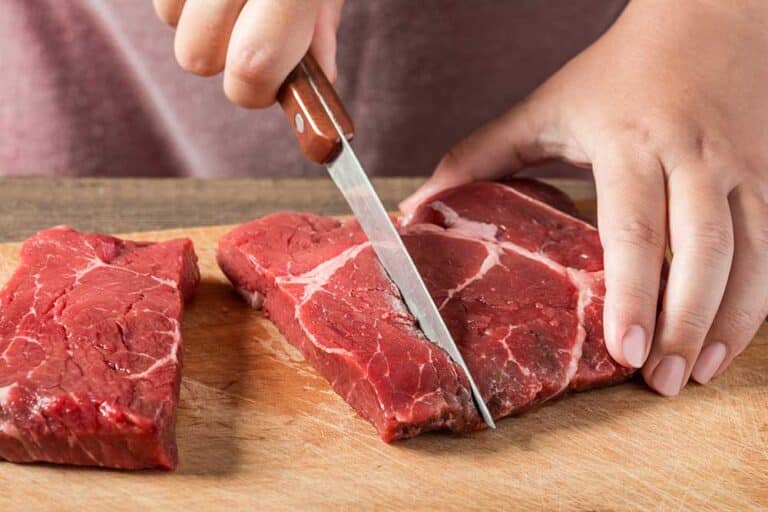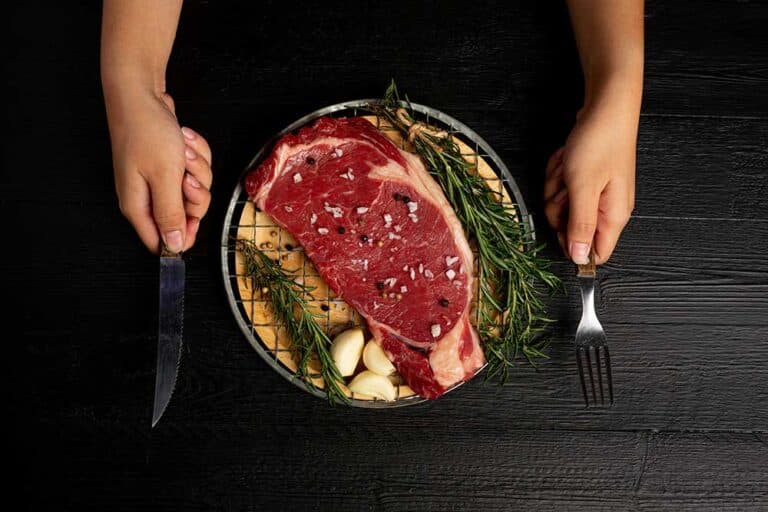Understanding the Carnivore Diet
Overview of the Carnivore Diet
The carnivore diet is a highly restrictive dietary plan that emphasizes the consumption of meat and animal products while eliminating all plant-based foods. Embracing this diet means adhering to a strict regimen consisting primarily of meat, fish, eggs, and small amounts of low-lactose dairy products.
| Food Category | Allowed Foods | Excluded Foods |
|---|---|---|
| Meat and Seafood | Beef, pork, lamb, chicken, fish, seafood | None |
| Eggs | Chicken eggs | None |
| Dairy Products | Butter, hard cheese, heavy cream (small amounts) | Milk, yogurt, any high-lactose dairy |
| Beverages | Water, bone broth | Coffee, tea, any plant-based beverages |
For those considering this eating plan, it’s crucial to understand the carnivore diet rules and the exact carnivore diet foods list.
Origins of the Carnivore Diet
The concept of consuming only animal-based foods dates back to ancient times when early humans relied primarily on hunting and meat consumption for survival. More recently, the carnivore diet has gained popularity through various proponents who claim significant health benefits.
Shawn Baker, the founder of MeatRX, is a leading advocate for the carnivore diet. He asserts that this eating plan has resulted in weight loss, improved mental health, and relief from chronic illnesses. Notably, prominent figures like Jordan Peterson and his daughter Mikhaila Peterson have publicly supported the beneficial carnivore diet results.
Understanding the historical context and the science behind the evolution of this diet can provide valuable insights into its perceived benefits and potential drawbacks. For an in-depth look at the benefits and criticisms, check out our section on the carnivore diet benefits.
Pros and Cons of the Carnivore Diet
Benefits of the Carnivore Diet
The carnivore diet, which focuses almost exclusively on meat and other animal products, offers several potential advantages. People adopting this diet have reported numerous positive effects on their health and well-being, making it a popular choice among those looking to improve their diet and lifestyle.
-
Weight Loss: One of the most commonly reported benefits of the carnivore diet is weight loss. By curbing carbohydrates and increasing protein intake, the body shifts its energy source from carbs to fats, leading to weight loss and decreased fat mass. A 2021 study revealed that individuals with diabetes following the carnivore diet reported significant weight loss compared to the overall group studied (Verywell Fit, Chomps).
-
Decreased Inflammation: Many followers of the carnivore diet have experienced decreased inflammation. The diet’s emphasis on animal products and exclusion of grains, starches, fruits, and vegetables may contribute to reduced inflammatory responses in the body.
-
Improved Hormone Levels: The carnivore diet’s high fat and protein content is believed to help in balancing hormones, leading to increased testosterone levels and improved overall hormonal health (Chomps).
-
Enhanced Mental Clarity: Many individuals have reported improved mental clarity and focus following the carnivore diet. The diet’s impact on blood sugar levels and energy sources may contribute to better cognitive function (Chomps).
-
Adequate Protein Intake: The carnivore diet provides sufficient protein, which is essential for muscle building, wound healing, and the production of enzymes and hormones (Verywell Fit).
Criticisms of the Carnivore Diet
Despite its potential benefits, the carnivore diet also faces criticism and raises concerns among health professionals and skeptics. Here are some of the main criticisms:
-
Nutritional Deficiencies: One of the primary concerns is the potential for nutritional deficiencies. By eliminating grains, starches, fruits, vegetables, and oils, the diet may lack essential vitamins, minerals, and fiber. This can lead to deficiencies in important nutrients such as vitamin C, potassium, and magnesium.
-
Health Risks: Adhering to a diet high in animal products can pose health risks, including an increased intake of saturated fats and cholesterol. This may elevate the risk of heart disease and other cardiovascular conditions.
-
Digestive Issues: The lack of dietary fiber in the carnivore diet can lead to digestive issues such as constipation. Fiber is essential for maintaining healthy digestion and promoting regular bowel movements.
-
Long-Term Sustainability: Many critics argue that the carnivore diet is not sustainable in the long term. The restrictive nature of the diet makes it challenging to adhere to, and the social and environmental implications of high meat consumption are also concerns.
-
Limited Food Variety: The carnivore diet’s strict exclusion of plant-based foods can result in limited food variety and monotony, making it less enjoyable and harder to maintain over time.
| Benefit | Criticism |
|---|---|
| Weight loss | Nutritional deficiencies |
| Decreased inflammation | Health risks from high saturated fats |
| Improved hormone levels | Digestive issues due to lack of fiber |
| Enhanced mental clarity | Long-term sustainability concerns |
| Adequate protein intake | Limited food variety |
To explore more about the carnivore diet and its impacts, readers can check out our detailed articles on carnivore diet benefits, carnivore diet side effects, and carnivore diet results.
Following the Carnivore Diet
Understanding the food guidelines and sample meal plans is critical for anyone looking to follow the carnivore diet.
Food Guidelines on the Carnivore Diet
The carnivore diet is highly restrictive, incorporating only animal-based foods. Here are the primary components:
- Meat: Beef, pork, chicken, lamb, and turkey
- Fish: Salmon, sardines, white fish
- Eggs: Whole eggs from chicken, duck, or quail
- Dairy (restricted): Small amounts of heavy cream and hard cheese with low lactose
- Organ meats: Liver, kidneys, hearts
By excluding all plant-based foods such as fruits, vegetables, grains, and legumes, adherents rely heavily on protein and fats derived from animal sources.
Here is a more detailed list for reference:
| Food Group | Recommended items |
|---|---|
| Meat | Beef, pork, chicken, lamb, turkey |
| Fish | Salmon, sardines, white fish |
| Eggs | Chicken eggs, duck eggs, quail eggs |
| Dairy (limited) | Heavy cream, hard cheese like cheddar or gouda |
| Organ Meats | Beef liver, kidneys, hearts |
For an extended list of approved foods, check out the carnivore diet foods list.
Sample Carnivore Diet Meal Plan
Creating a meal plan can help streamline the transition to the carnivore diet. Below is a 7-day sample meal plan, which includes meals and snacks tailored to the guidelines mentioned above (Verywell Fit).
| Day | Breakfast | Lunch | Dinner | Snacks |
|---|---|---|---|---|
| Monday | Scrambled eggs, bacon | Chicken breasts | Beef liver stew | Hard-boiled eggs |
| Tuesday | Omelette with heavy cream | Pork chops | Salmon fillet | Cheese slices |
| Wednesday | Fried eggs, ham steak | Turkey drumsticks | Grilled lamb chops | Beef jerky |
| Thursday | Hard-boiled eggs | Sardines in olive oil | Ribeye steak | Pork rinds |
| Friday | Bacon, poached eggs | Beef kebabs | Grilled chicken thighs | Cheese cubes |
| Saturday | Egg muffins | Beef liver and onions | Shrimp skewers | Smoked fish |
| Sunday | Eggs Benedict sans muffin | Crab legs | Ham steak | Hard cheese |
Adhering to this meal plan will ensure you’re getting the right nutrients. However, tracking and personalizing your diet is key. Modify this plan to better fit your needs after consulting with healthcare professionals.
For those looking to diversify their diet while still following the basic principles, consider exploring carnivore diet recipes and check what can you eat on the carnivore diet for more ideas.
By following these guidelines and meal plans, individuals can effectively embark on the carnivore diet journey and explore its potential benefits.
Health Implications of the Carnivore Diet
Nutritional Concerns on the Carnivore Diet
One major concern with the carnivore diet is its lack of essential nutrients. This diet eliminates several important food groups, including grains, fruits, vegetables, nuts, seeds, and plant-based oils (Verywell Fit). As a result, followers of this diet can experience deficiencies in key nutrients such as Vitamin C, dietary fiber, and plant compounds like antioxidants, which are crucial for maintaining overall health.
| Nutrient | Potential Deficiency |
|---|---|
| Vitamin C | Scurvy, weakened immune system |
| Fiber | Digestive issues, constipation |
| Antioxidants | Increased oxidative stress |
These deficiencies can lead to various health problems, including scurvy, digestive issues, and increased oxidative stress on the body. For individuals wondering what can you eat on the carnivore diet, it is essential to consider these potential gaps in nutrition.
Health Risks Associated with the Carnivore Diet
The carnivore diet is high in fat, particularly saturated fats, cholesterol, and sodium. This dietary pattern can pose several health risks:
- Heart Disease: High levels of saturated fat and cholesterol can increase the risk of cardiovascular diseases.
- Kidney Health: The excessive intake of protein and sodium can strain the kidneys, leading to potential kidney diseases (Chomps).
- Blood Pressure: A diet high in sodium can elevate blood pressure levels, increasing the risk of hypertension.
- Cancer Risk: Consuming large amounts of red and processed meats has been linked to an increased risk of certain types of cancer.
| Health Risk | Potential Outcome |
|---|---|
| Heart Disease | Increased risk of cardiovascular diseases |
| Kidney Health | Potential for kidney disease |
| Blood Pressure | Hypertension |
| Cancer Risk | Increased risk of certain cancers |
Understanding these risks is important for anyone considering the carnivore diet. It is advisable to seek advice from a healthcare professional before making significant dietary changes.
For more detailed information on similar risks and how to manage them, refer to our comprehensive guide on carnivore diet side effects. Additionally, readers might find our articles on carnivore diet rules and carnivore diet benefits informative for a balanced view.
Modified Carnivore Diet Options
Adapting the Carnivore Diet
Adapting the carnivore diet can offer some flexibility while maintaining the core principles of a primarily animal-based regimen. There are various ways to modify the diet to suit individual needs, health conditions, or preferences.
-
Incorporation of Dairy: Including dairy products like cheese, butter, and heavy cream can add variety and nutritional benefits. Dairy provides essential vitamins and minerals while still adhering to the animal-based nutrient profile. For more information on dairy options, refer to our carnivore diet foods list.
-
Inclusion of Eggs: Eggs are a nutrient-dense food that can be integrated into the carnivore diet. Eggs contribute protein, healthy fats, and essential nutrients like choline and biotin.
-
Organ Meats: Adding organ meats like liver, kidney, and heart can enhance the nutrient density of the diet. Organ meats are rich in vitamins such as B12, A, and minerals like iron.
-
Bone Broth: Consuming bone broth can provide collagen and gelatin, supporting joint health and gut integrity. Bone broth is also a good source of electrolytes, which is crucial for those on a restricted diet.
| Modification | Nutritional Benefit | Examples |
|---|---|---|
| Dairy | Calcium, Vitamin D | Cheese, Butter, Cream |
| Eggs | Protein, Choline | Chicken Eggs, Duck Eggs |
| Organ Meats | Vitamins, Iron | Liver, Kidney, Heart |
| Bone Broth | Collagen, Electrolytes | Beef Bone Broth, Chicken Bone Broth |
Personalization and Modifications
Personalizing the carnivore diet allows individuals to tailor it to better fit their unique health needs and lifestyle. This customization can help maintain adherence and improve overall satisfaction with the diet.
-
Elective Carbohydrate Inclusion: Adding small amounts of low-carb vegetables or fruits can make the diet more manageable for some. Options may include leafy greens or berries in minimal quantities, enhancing fiber intake and variety.
-
Intermittent Fasting: Combining the carnivore diet with intermittent fasting protocols can amplify weight loss and metabolic benefits. For those looking to integrate fasting, our carnivore diet weight loss article provides insightful guidelines.
-
Electrolyte Supplementation: Ensuring adequate electrolyte intake is essential to prevent imbalances. Incorporating supplements that provide sodium, potassium, and magnesium can be beneficial. For more on this, see our section on carnivore diet side effects.
-
Spices and Seasonings: While the basic carnivore diet may limit seasonings, allowing certain spices can aid in flavor and palatability without compromising the diet’s integrity. Examples include salt, pepper, and herbs.
-
Meal Timing and Frequency: Adjusting the number of meals per day or the timing of those meals can help individualize the diet. Whether it’s one, two, or three meals a day, tailoring meal frequency can support long-term adherence.
For more specific modifications and how they may suit individual preferences, see our comprehensive guide on carnivore diet rules.
By understanding and implementing personalized adjustments, the carnivore diet can be both flexible and sustainable, catering to the diverse preferences and nutritional needs of individuals. For a broader range of recipes, explore our carnivore diet recipes.
Beyond the Carnivore Diet
Exploring variations and considering long-term sustainability is essential for those interested in the carnivore diet meal plan. Here we delve into different adaptations of the diet and strategies to maintain its principles over time.
Variations of the Carnivore Diet
While the traditional carnivore diet focuses on consuming only animal products, various modified approaches have emerged to address personal preferences, health goals, and lifestyle factors.
-
The “Meat and Fruit Carnivore Diet”: This version allows for incorporating natural forms of carbohydrates and antioxidants through fruits. It provides variety and nutritional balance by combining high protein and fat intake with the benefits of fruits. It’s ideal for those wanting to remain in ketosis while obtaining essential nutrients from fruit (Ancestral Supplements).
Food Group Examples Meat Beef, Pork, Chicken Fruits Berries, Avocados -
The “Greenish Carnivore Diet”: This adaptation combines the consumption of primarily meat with a small portion of leafy greens and low-carb vegetables. It balances the benefits of animal-based foods with the health advantages of greens, making it suitable for those seeking additional fiber and micronutrients (Ancestral Supplements).
Food Group Examples Meat Lamb, Fish, Eggs Vegetables Spinach, Kale, Broccoli
These modifications allow individuals to personalize their diet based on their body’s signals and nutritional needs.
Considerations for Long-Term Sustainability
Adapting the carnivore diet to fit long-term lifestyle requirements involves balancing dietary preferences, health needs, and social factors.
-
Dietary Satisfaction: Introducing a variety of foods can prevent monotony, making it easier to adhere to the diet. For example, adding fermented foods like sauerkraut and kimchi can improve gut health while keeping the diet enjoyable.
-
Nutritional Balance: Ensuring a broader spectrum of vitamins and minerals is crucial. Integrating nutrient-dense, non-animal foods can address potential deficiencies and support overall health.
Nutrient Potential Sources within Modified Carnivore Diet Vitamin C Berries, Spinach Fiber Leafy Greens, Fermented Vegetables -
Lifestyle Integration: Modifying the diet to include low-carb veggies or fruits can make it easier to manage social gatherings and eating out. This flexibility helps maintain the core carnivore principles without feeling restricted.
-
Health Considerations: Personal health goals and unique dietary needs should guide the choice of modifications. For instance, someone with higher activity levels might need extra carbohydrates from selected fruits or vegetables.
-
Personal Preferences and Ethical Considerations: Modifying the diet allows for cultural factors and ethical beliefs to be respected, supporting a more individualized approach to health and wellness.
For those seeking more variety in their diet, explore carnivore diet recipes and carnivore diet foods list for inspiration. Understanding these variations and long-term strategies can help maintain the benefits of the carnivore diet while ensuring it remains a sustainable, enjoyable lifestyle choice.
- About the Author
- Latest Posts
Johnnie D. Jackow Sr., the founder and CEO of Total Body Fitness, Worldwide, has a long-standing career in the fitness industry. He began as a certified personal trainer in the mid-90s and soon after authored his first weight loss book in 1998. This led to the launch of Total Body Fitness, Nationwide in the USA at the same time. Johnnie gained recognition as the fitness guru of his time, running infomercials on local TV late at night in Houston, Texas. Over the years, he has helped more than 40,000 individuals from all over the world achieve their health and fitness goals. With over 60,000 hours of documented training in integrative functional medicine, he completed his PhD in human physiology in 2010. His primary objective is to assist people in reaching their health and fitness goals through alternative approaches rather than relying solely on conventional medicine and pharmaceutical drugs. Today, with almost three decades of experience under his belt, Johnnie continues to be a leader in health and fitness.








